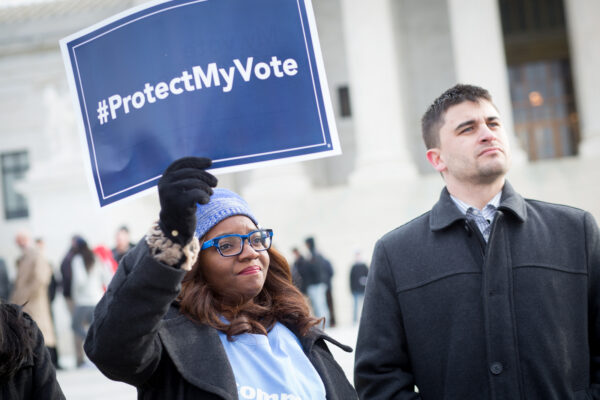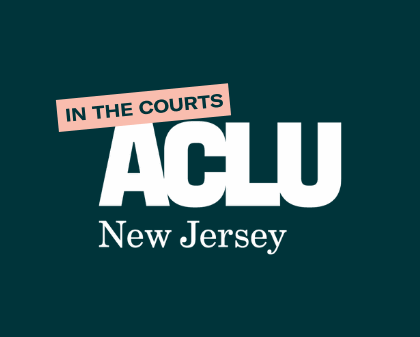Voting is about power. It’s about the power to choose our elected representatives, and it’s about our power as constituents to influence how those representatives govern. Currently, a political candidate in New Jersey can be the nominee of only one party, limiting each voter’s choice and often forcing them to cast a ballot that doesn’t fully reflect their political preferences.
Fusion voting would change that by maximizing the power of every vote – but it’s currently banned in New Jersey. The ACLU of New Jersey is supporting efforts to bring it back.
Fusion voting enables a candidate to accept the nomination of more than one political party – typically, the Republican or Democratic Party (“major” parties) and one or more “minor” parties such as the Moderate Party, the Libertarian Party, or the Working Families Party. That candidate then appears on the ballot under the banner of each party, and the parties’ votes are combined to determine the candidate’s total count. By voting for a major-party candidate on a minor party’s line, voters can register their support for the minor party’s platform without casting a symbolic “spoiler” vote. Fusion voting was a successful practice in New Jersey and across the country throughout the late nineteenth and early twentieth centuries until a wave of fusion bans aimed at entrenching the dominance of the two major parties swept the states.
A lawsuit is underway in New Jersey that could restore fusion voting. It was initiated by New Jersey voters who contend that the state’s ban on fusion voting is unconstitutional. The ACLU of New Jersey agrees, and we filed a “friend-of-the-court” brief with leading state constitutional law scholars Robert F. Williams and Ronald K. Chen to explain why.
The ban on fusion voting violates the right to vote enshrined in the New Jersey Constitution.
The freedom to choose for whom to vote is fundamental to democracy. Under the fusion ban, that freedom is blunted. Minor-party voters may elect either to cast a protest vote for a minor-party candidate with no reasonable hope of prevailing, or back a viable major-party candidate and thereby reinforce a political mandate with which the voters may strenuously disagree. Regardless of the path a minor-party voter may follow, the fusion ban inhibits their choice and forces them to cast a ballot that may be only partially authentic to their preferences – they receive less than a true choice among candidates, less than a meaningful ballot, and therefore, less than the constitutional right to vote.
Anti-fusion laws violate the rights to free speech and association protected by the New Jersey Constitution.
When a political party nominates a candidate, they are exercising their right to free association – doing so is the mechanism by which the party affirms its principles, declares its positions, and appeals to potential members. Under New Jersey’s fusion ban, that mechanism is constrained the moment any candidate accepts a major-party nomination; from that point forward, the minor party can no longer freely associate with the nominee, who may be the best (or only) representative of the party’s political message.
A corresponding burden simultaneously falls on the candidates. Once a candidate becomes a major-party nominee, they may no longer affiliate with a minor party on the ballot – a state-imposed limitation on one of the most powerful tools available to political aspirants.
And perhaps no burden is heavier than the one the fusion ban imposes on voters’ free expression. Under New Jersey’s fusion ban, voters are substantially limited in their ability to use the ballot to express support for a minor party’s platform. Without the option to vote for a cross-nominated major-party candidate, voting on the minor-party line almost always means voting for a candidate who has no realistic chance of winning the race. Unsurprisingly, few voters accept that bargain.
New Jersey’s fusion ban is not just unconstitutional – it is inconsistent with the state’s tradition of political independence.
More than a third of registered New Jersey voters are not affiliated with a major political party. And yet, because of New Jersey’s fusion ban, these unaffiliated voters have no effective vehicle for expressing their alternative policy preferences at the ballot box; they are effectively forced to vote on the Democratic or Republican party lines. Recent polls show that most New Jersey voters support a return to fusion voting.
Lifting the unconstitutional and unpopular ban on fusion voting is one among several critical steps that will strengthen democracy in New Jersey.
In a democracy, political power is a positive feedback loop; accountability generates more accountability, participation inspires more participation, progress fuels more progress. In other words, every win for voting rights further strengthens our democracy.
While we fight to end the fusion ban in the courts, we are also asking the Legislature to act now to protect voting rights. New Jersey has a historic opportunity to lead the nation in increasing access to the ballot and uprooting racial discrimination in voting by passing the John R. Lewis Voting Rights Act of New Jersey (NJVRA). Federal voting rights protections are fragile and inadequate. The NJVRA would provide New Jersey with stronger tools to fight discriminatory voting rules, expand language access for voters with limited English proficiency, and establish a “preclearance” program that requires local governing bodies with a history of discrimination to prove that any proposed changes made to the voting process will not harm voters of color.



